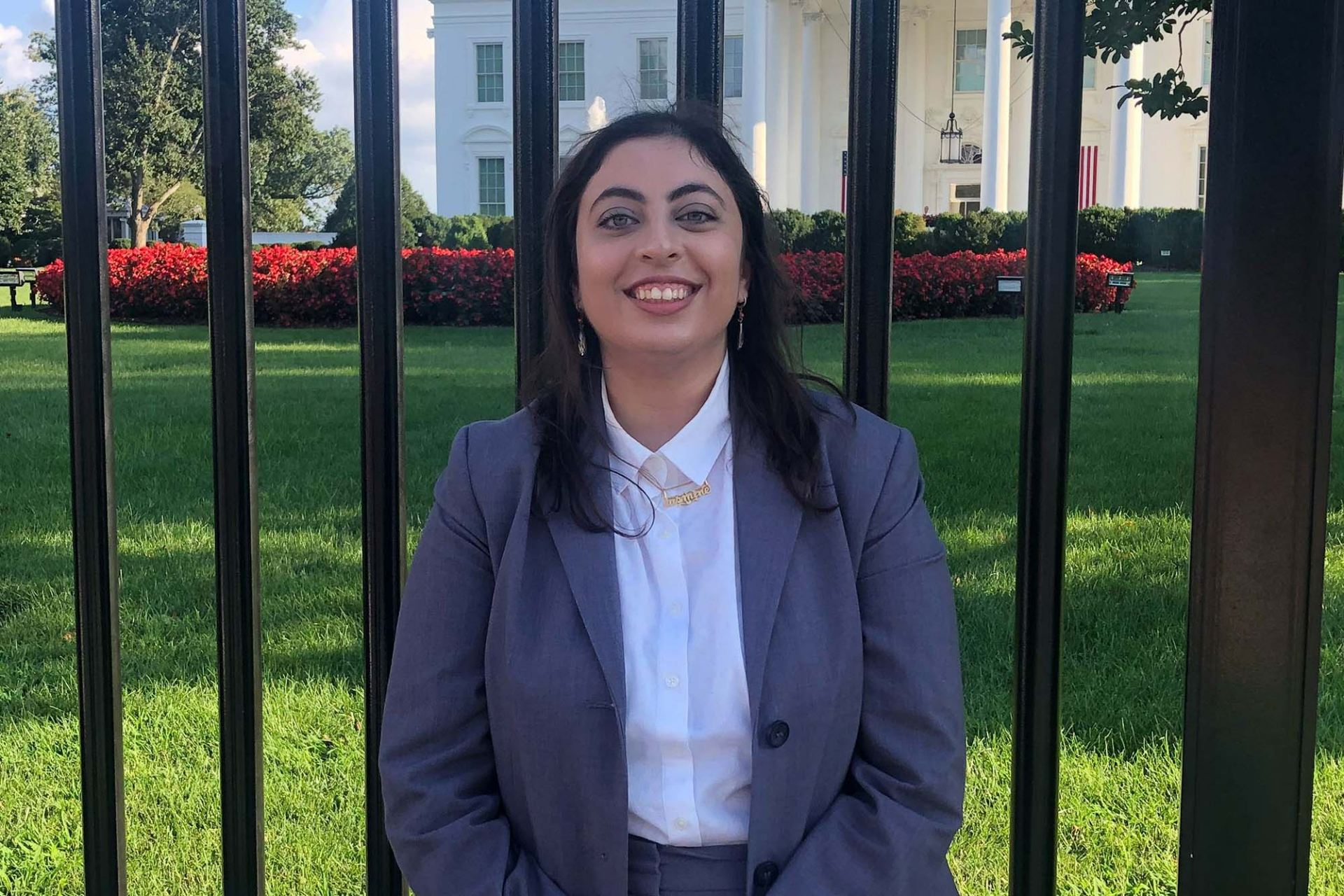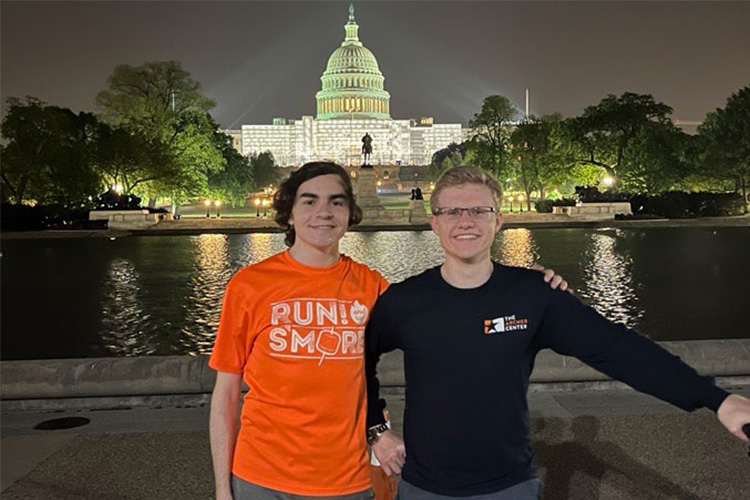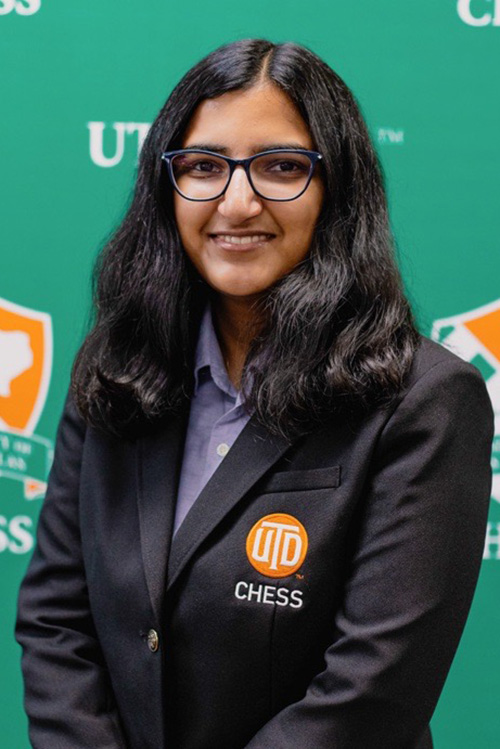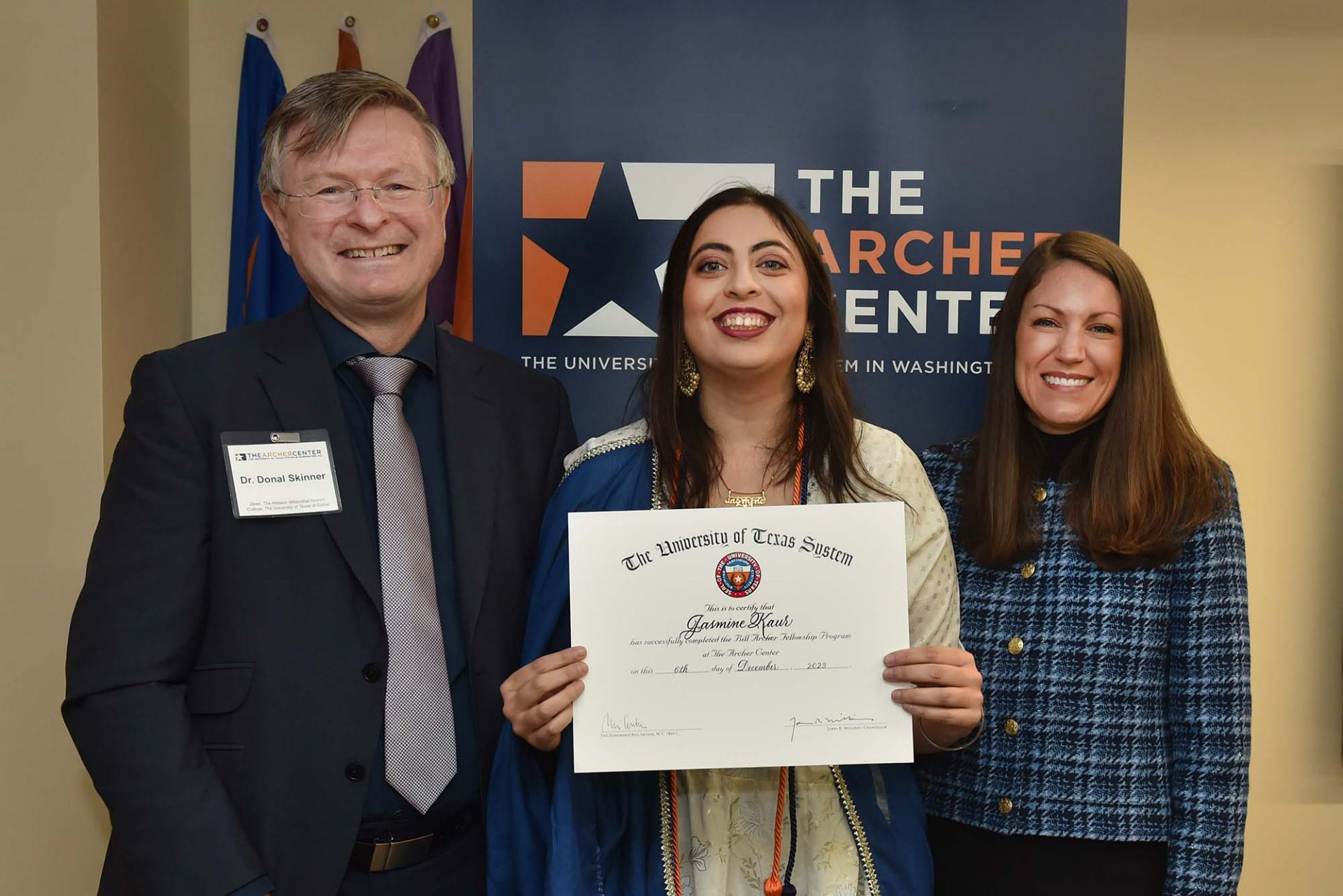Students Stretch Horizons as Archer Fellows in Washington, D.C.
By: Jessica Good | Feb. 7, 2024

University of Texas at Dallas political science senior Jasmine Kaur had never lived away from her family before the fall of 2023.
That semester she moved to Washington, D.C., interned with a public service nonprofit, made new friends and altered the trajectory of her future.
Kaur was one of 10 Archer Fellows from UT Dallas who took classes and completed internships in the nation’s capital last fall. Established by the UT System in conjunction with former U.S. Rep. Bill Archer, the Archer Center has offered a comprehensive academic and professional experience since 2001 to help prepare students from across the UT System for public service leadership roles. Nearly 2,000 UT System students, including more than 330 from UT Dallas, have participated in the fellowship.
“The personal development fostered by the Archer Fellowship was life-changing,” Kaur said. “Being completely uprooted from somewhere and being able to live alone for almost six months allowed me to grow both as an individual and professionally.”

Another Archer Fellow, Tyler Burkhardt, came to UTD with a strong interest in the natural sciences but didn’t want to be a research scientist. After discovering an interest in policymaking, he switched his major to public affairs and is minoring in physics and political science.
“The Archer Fellowship seemed like a good opportunity to experience working at the confluence of science and policy right now,” said Burkhardt, a National Merit Scholar and Eugene McDermott Scholar who completed his fellowship last spring.
That diversity of interests among the fellows is no accident.
Archer Center Executive Director Katie Romano said the program administrators want participants from every major.
“At the heart of the Archer Fellowship Program is bringing students together from different backgrounds and policy interests to learn from each other,” she said. “The Archer Center is like a springboard, a launching pad for students to reach the next step in their professional or academic journey.”
To Apply
The deadline to apply for the fall 2024 or spring 2025 Archer Fellowship Program is Feb. 15. Applications for the graduate program in summer 2025 will open in the fall.
Archer Fellows intern full time with an organization of their choosing based on their own professional and academic goals and interests. Students selected for the program are responsible for securing their own internships but receive one-on-one support. Fellows earn 15 hours of in-residence credit for their experience in Washington. They take classes focused on policy, history and advocacy from UT faculty members as well as Washington-based lecturers, all of whom are seasoned professionals with deep policy expertise. Fellows have interned with prestigious organizations, including the United Nations Information Center, the Supreme Court, the U.S. Department of State and offices at the White House and on Capitol Hill.
Kaur interned with the Partnership for Public Service, where she worked on the government affairs team. Her first task was helping to prepare the organization’s vice president to testify before Congress.
“My first two weeks were spent doing research and helping prepare his speeches for the hearing,” she said.
Burkhardt, who interned with the Environmental and Energy Study Institute, was able to merge his interests in natural sciences and policy. He spent a lot of his time as a policy intern running briefings on Capitol Hill for members of Congress.
“Being an Archer Fellow reinforced a shift that I was already thinking about,” he said. “My plan is to pursue a postgraduate opportunity in the environmental policy space and to work to tackle some of these science-influenced issues in government.”
In 2010, the Graduate Archer Fellowship Program was created to help graduate, doctoral, medical and law students interested in policy and politics learn about the federal government and public service. Cohorts complete their internships and studies, as well as research projects, during the summer. They earn nine hours of in-residence credit, take classes focused on the federal policy process and work independently with experienced policy experts to develop their own policy recommendations.

Tarini Goyal, a business analytics and business administration graduate student, interned with telecom firm TeleGeography last year.
“We learned many things about geopolitics because the telecom world and how the submarine cables work across the world are closely connected,” said Goyal, whose research project focused on increasing women’s participation in the federal engineering workforce.
After graduating from UTD, Goyal, a member of UTD’s chess team, hopes to find a job in impact consulting, which focuses on maximizing organizations’ positive effects on the world.
“I like the way consulting is structured, because I have the freedom to contribute ideas,” she said.
Kaur’s Archer Fellowship experience has helped her refine her career goals.
She plans to add a second major in computer information systems and technology and pursue a career in cybersecurity policymaking with the federal government.
“My time in the Archer Fellowship Program helped me realize that’s what I want to do,” she said. “Prior to that, it was just an idea, but now I’ve homed in on this niche intersection of these two degrees that not many people pursue.”
Dr. Donal Skinner, the Mary McDermott Cook Chair and dean of the Hobson Wildenthal Honors College, said the Archer Fellowship Program can change students’ lives and lead to long-lasting friendships.
“Not only do students get to apply the knowledge that they have acquired in classes at UTD, but they also get to understand and be a part of the inner workings of government,” he said. “Students interact with extremely talented faculty, visiting dignitaries and guest speakers. Every UTD student, regardless of discipline, should aspire to be selected as a prestigious Archer Fellow.”
It’s impossible, Burkhardt said, to spend a semester in Washington without developing a sense of awe about United States history. His favorite memory is of the last night of his fellowship.
“We were all packing up and working on moving out, when a large number of people in my cohort rented bicycles and went for a ride,” Burkhardt said. “We biked from the apartment we were living in down to the Washington Mall and the Capitol.
“It was dark out, so everything was all lit up. We wanted to take in the sights in Washington one more time, because we were either working in those buildings or commuting past them every day.”

Media Contact: Jessica Good, UT Dallas, 972-883-4319, jessica.good@utdallas.edu, or the Office of Media Relations, UT Dallas, (972) 883-2155, newscenter@utdallas.edu.





